
My views on the movies in the X-Men franchise are rather mixed. On the one hand I consider it a far more promising series from the early 00s era than the Blade movies or Raimi's Spider-Man. On the other hand, when "X-Men: The Last Stand" came out I didn't find it a horrendous disappointment by comparison to the previous two instalments. When Matthew Vaughn released the semi-reboot "X-Men: First Class" I considered it by far the best in the series.
So, with "X-Men: Days of Future Past" featuring both the old and the new cast members, I felt it was a good idea to refamiliarise myself with the old movies.

X-Men (2000)
It's interesting that, while the original X-Men is a fairly by-the-numbers action movie, I find a lot here that I look back on fondly now that this is a huge money-making franchise.
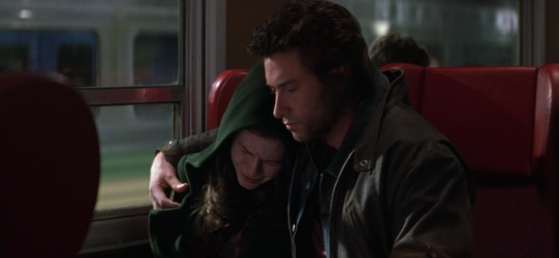
The best parts of the story here all concern the relationship between Rogue and Wolverine. It's actually possibly not such an unusual set-up. An older figure looks out for a younger figure and then discovers how important the younger figure is. Heck, that's practically the plot of Disney's "Sword In The Stone". But Wolverine is no wise mentor figure and it's the flawed aspects of both characters that makes them compelling, particularly when they first meet up.
Even more remarkable however, is the opening scene of the film displaying Magneto discovering his powers within the context of the holocaust. It's remarkably subtle considering that we don't find out straight away that the boy is supposed to be a young Ian McKellan.
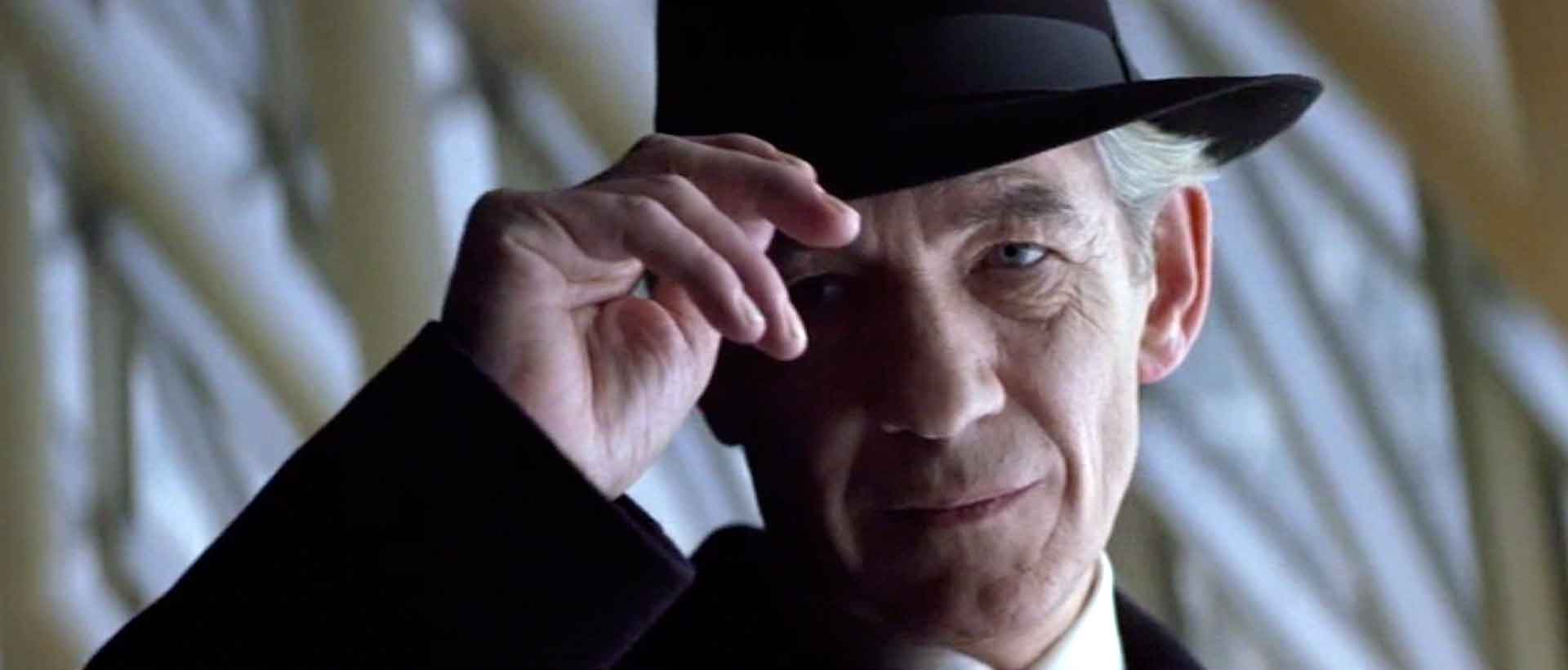
I'm sorry to say this, but I think Joss Whedon screwed up the third act. He claims that he was handed an impossible task because the first two acts sucked, but to be quite frank, the first two acts were a fine beginning to this franchise. Joss also claims that most of his writing was left out, yet there are at least two lines in the third act which are his own contributions. His excuse for the "what happens when a toad is struck by lightning" line is pitiful. I'm sorry Joss, but it doesn't matter how you utter that line. It's still awful.
But naturally not all the blame can be placed on Joss Whedon. Singer is responsible for the end product and there is admittedly some rather less impressive melodrama in the third act, with the music swelling to somewhat undeserved highs, and that is clearly Singer's own fault.

It needs to be remembered though that the superhero genre was at a low point when "X-Men" came out and that the more moderate quality of the first X-Men movie is nevertheless an important milestone for superhero movies. The subtext of minority rights and the rhetorical question "Well, what would you prefer? Yellow spandex?" (dismissing the cheesy costumes of the comics) established the possibility of a more plausible approach to superhero movies, long before Nolan came on the scene.

Nevertheless, by today's standards the final product is still cartoonish and while it sows the seeds for greater films to come, it is every bit the cheesy blockbuster that many dismissed it as on its initial release. Some of the comic relief (such as that involving the character of Sabretooth) seems very out of kilter even with the sequel, never mind more recent films in the series. The promising beginnings do not pay off until later movies, with the third act here seeming decidedly cheesy.
C-

X-Men 2 (2003)
Now this was quite a surprise. Admittedly I'm still not entirely sold on X-Men 2, but it's a lot better than I remember. X-Men 2 not only has some spectacular action sequences, but it also does a very good job of building on the characters and themes of the first instalment. Watching the two movies close together this time, I realised that this was rather more subtle than I remembered.
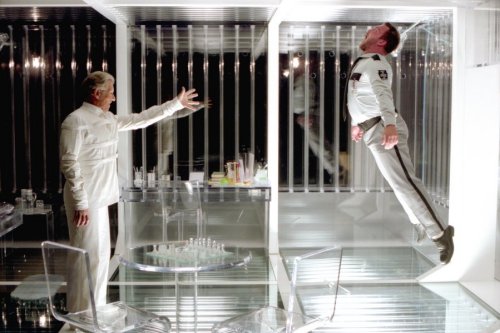
In the end though, the real appeal of these early X-Men films remains the solid central performances from Patrick Stewart, Ian McKellan, Hugh Jackman and, in this film, Brian Cox. I will also note that the backstory for Mystique established in "X-Men: First Class" meant that I was looking at her character rather more closely than before. While Ian McKellan has always given Magneto greater depth, Mystique had always come across like an especially athletic henchman. This time I was looking out for clues to her character's motivation and while there's not much here, the additional interest in this character produced by the later movie made her scenes a lot more exciting. I was invested in this movie more than I have ever been before.

I'm also less annoyed this time around by how little importance Rogue has here. Rogue acted as the audience's introduction to the X-Men universe in the first movie, but here in the sequel there's very little to her character other than her angst about not being able to sleep with her boyfriend. This side-plot has no resolution and Rogue really plays second fiddle to her two friends with ice and fire powers.

While the first film gave us the bare bones of the X-Men universe, the sequel further establishes the characters of Professor X, Magneto and Wolverine. I'm going to insist, however, that what happens to Professor X's psychic protege, Jean Gray, in this film seemed completely baffling to me. It felt like a bit of a 'because it's in the script' moment.
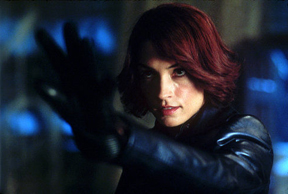
The conversations between Storm and Nightcrawler about faith are rather cheesy. I know what Singer is trying to do with those scenes because it's being telegraphed loudly and so when placed alongside some of the other more subtle character work and the over-arching themes of the movie, those parts come off as particularly daft. There aren't many self-righteous characters, but the self-righteous moments are generally the more problematically written (and yes, that does include some of Patrick Stewart's lines as Professor X - no matter how confidently and deftly he delivers them).

X-Men 2 is a better than average superhero film. The effects have since been outdone and the few humourous moments aren't generally that effective. There are also some rather awkward loose ends in the script. (There's one point where one mutant living at the school takes a number of the characters to his parents' house. This section of the film finishes with police cars being blown up. It's a pretty neat finale to that section of the film, but it doesn't really justify the tangent. Also there MUST be some consequences to that confrontation, but in this film those consequences are left unexplored.) However, several central actors still bring some pretty powerful acting performances here which elevate the material and help to push forward the underlying metaphor about minority rights which makes this series so special. Brian Cox makes for a far more compelling villain-of-the-day than most and his contribution to the film's success must not be underestimated.
B+

X-Men 3: The Last Stand (2006)
X Men 3 is a film that has received a bad press, but I haven't always understood the criticisms. One criticism is that it kills off the least popular of the X-Men. I cannot say that upset me much. Essentially the writer decided to fridge an unpopular male character. This happens to female characters all the time, often far more interesting female characters too, without much upset from fans. Another criticism is that Jean Gray's "Dark Phoenix" transformation isn't an alien possession like in the comics. Once again, I'm not personally terribly upset by this.

I heard that it didn't make sense for Dark Pheonix to be working with Magneto, but actually she's not really controlled by Magneto at all. She's simply spending time with him while she works out what to do next. Really the problem here is not with Dark Phoenix at all, but rather with Magneto. But first let's talk about Mystique. Now Mystique has generally been portrayed as a ruthless henchman rather than as a character with complex motivations in these early X-Men films. But in the third movie she's actively threatening to kill people violently. Sure she's always been ruthless but she hasn't been promising to kill people before. Magneto's rescue attempt is also pretty violent, almost certainly killing at least 10 people. Later on, Magneto would claim that the humans had drawn first blood, in spite of his own mass-murder which they were retaliating against.

So the villains are more brutal and far less sympathetic this time. But what's more, Magneto is far more selfish than we've ever seen him before here. I won't spoil anything, but it's a moment between Magneto and Mystique and think few people could fail to be shocked by how Magneto acts here.
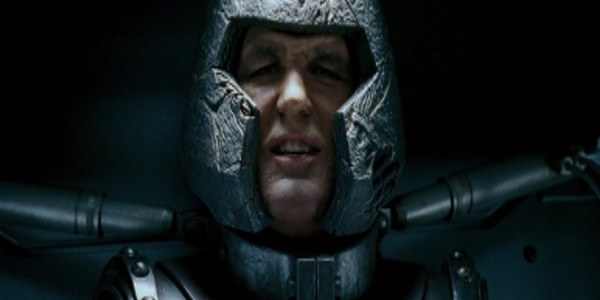
Of course, X-Men 3 is also the film with the immortal line "I'm the Juggernaut, bitch!" It is a film stuffed full of characters with very little time spent building up any of them. Beast, the big blue hairy yet well-spoken character, turns up out of nowhere and acts as if he had always been there. While those familiar with the cartoons would know who this was, it's quite jarring in the movie universe for him to show up out of nowhere.

Still, it should also be noted that the scenes in Xavier's school for the gifted are rather more interesting than before. The school has essentially turned into Hogwarts with people using their abilities all over the place for mundane ends. We also get a rather cool ice-skating scene involving the mutant with ice powers. There's a lot of cool little details which have been shoved in here.

Yet in the end, X-Men 3 is a rather mindless movie. It seems to hurry to shove in all the little bits and pieces we missed out in previous films. A large number of extra mutant characters are added in here. The danger room (essentially the holo-deck from Star Trek) is added in. We get to see a nod to the Sentinel robots. Yet even while the film is a bit of a mess, Stewart, McKellan and Jackman are all still here working their magic. And even if Phoenix isn't what the fans were expecing her to be, there's no doubt that Famke Janssen gives a great performance in that role too. As always, the actors elevate the material, even when the script isn't anything like on the level it should be.

Overall "The Last Stand" is rather directionless. A few interesting ideas are set-up at the beginning only for the film to devolve into an array of set-pieces. The most obvious example being the character of Angel, the young boy ashamed of his wings who is the son of the scientist proposing a 'cure' for mutants. He seemingly has two scenes in the film. One where he is desperately trying to cut off his wings and another where he uses his wings (which have quickly grown back) to fly away from the facility before they can 'cure' him. That's his entire appearance in the film, yet it feels like the beginnings of a much more interesting story. "Last Stand" takes more from the cartoonishness of the first film than from the themes of the second. It's bizarre that a film which introduces the powerful and aptly named Dark Phoenix and begins by killing off a major character should end up being so fluffy and lightweight.
C-

X-Men: First Class (2011)
When I first watched this in the cinema I was rather distracted during the big finale by a desperate need to use the facilities. This doesn't happen often. So while I stuck out through those later scenes I wasn't able to focus as well as I'd have liked. I still maintain that having Magneto do a big speech towards the end feels unnatural. Yet on a second watch it's not anything like so problematic as I originally thought. The whole missile-exchange section in the final act (he says, avoiding spoilers) seemed overblown on first watch, but revisiting it now it feels a lot more successful in producing tension.
(My original review is here)
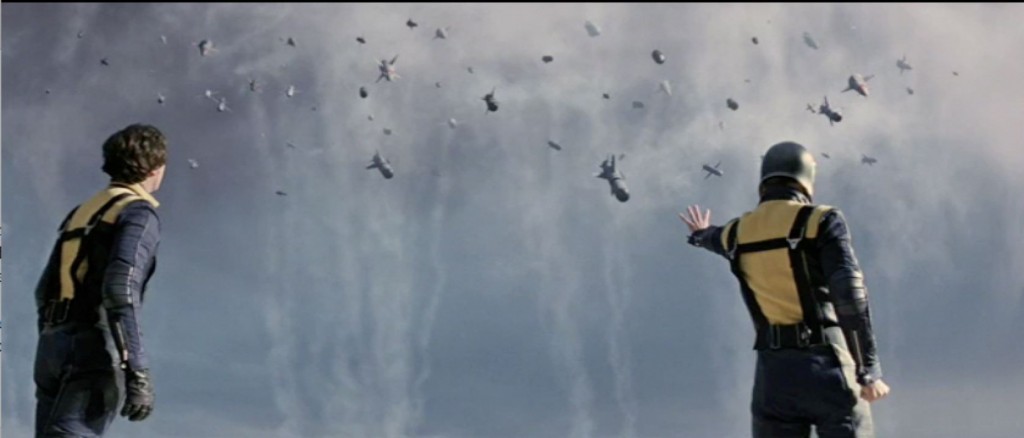
Okay, yeah, sorry for TMI elements there. First Class is a much more character-focussed X-Men movie than we'd ever had before. Sure, there have always been character moments, but First Class is the first of the movies to successfully focus on ALL of the characters rather than just a select few. It's funny actually, since the big complaint about "X-Men: First Class" always seemed to be the number of different characters it tries to juggle and the inevitable lack of attention the movie can give to all of them. Yet on a second watch, it seems like they all have clear character traits and they all manage to develop themselves in some way.
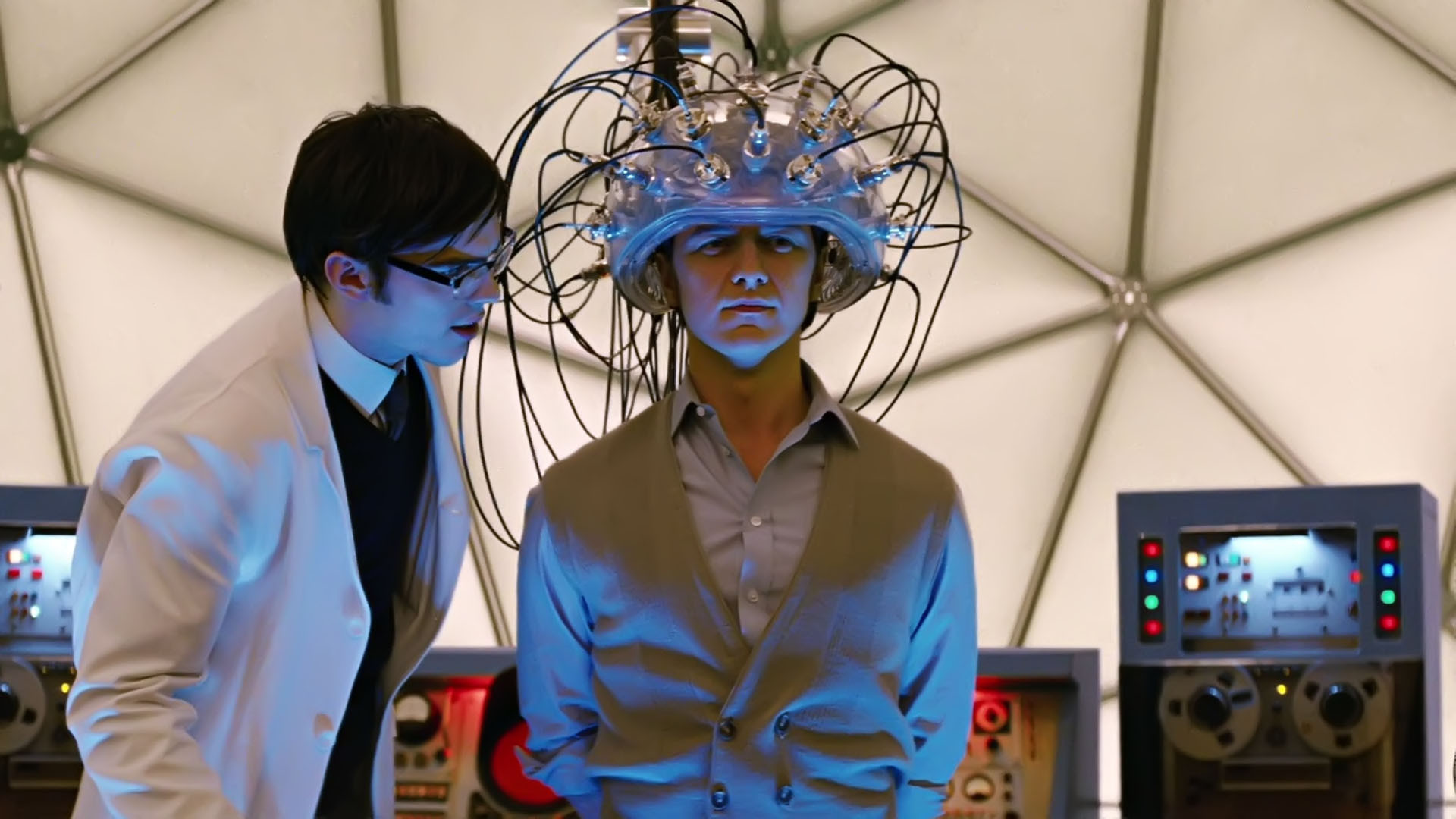
"Don't touch the hair."
Another element, which always appeals to me, is the humour. There are a lot of very effective funny moments in this film. And it's actually quite fun to have a somewhat mischievous version of Charles Xavier who is constantly trying to pick up girls, rather than the super-confident Mr. Perfect from the earlier films.

"X-Men: First Class" is perhaps most notable in that it explores the character of Magneto in a way that has never been done before. So well, in fact, that I know of several people who would quite happily have sat through a whole film dedicated to "Erik Lehnsherr: Nazi Hunter" rather than spending any time with Xavier's group of recruits.
A+